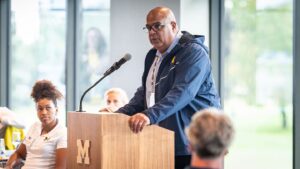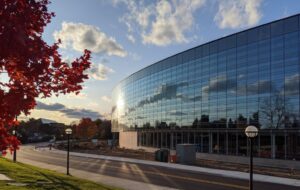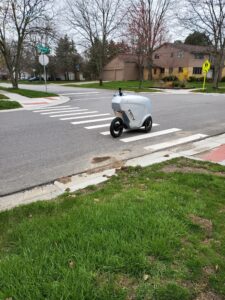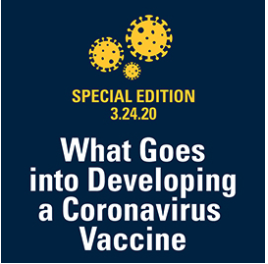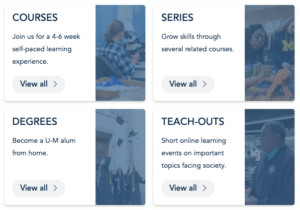Are we there yet?
As the weeks in temporary lockdown continue, the brilliant minds at the University of Michigan are racing to curb the spread of COVID-19 and find ways to open U-M’s doors to students this fall.
This page is in no way comprehensive, but it offers a number of campus-wide links to news and feature stories, helpful tips, free courses, Q&As, and more. We suggest you visit Michigan Medicine and the School of Public Health for even more information. The Michigan Health and Michigan Lab blogs have published an extensive directory of stories related to the coronavirus.
May Q&A with President Schlissel and The Michigan Daily
President Schlissel on fall 2020 classes: ‘It’s unlikely to be a normal semester’
Each month, The Michigan Daily sits down with U-M President Mark Schlissel to discuss important questions about University policy, commitments, and challenges. This month, Daily reporter Calder Lewis conducted the interview virtually. Topics ranged from COVID-19, the University’s response to sexual misconduct allegations against former sports doctor Robert Anderson, and finances.
Michigan Daily: You wrote in an email that you are “cautiously optimistic we will be able to deliver a public health-informed fall semester on our three campuses.” What public health scenarios are you evaluating and what plans is the University looking at to accommodate these scenarios in the fall?
Mark Schlissel: Well, it depends on what the status of the pandemic is in the fall. If you just think back six or seven weeks or two months ago, life was completely different. The fall semester doesn’t start for another four months. The number of cases in Michigan, fortunately, is on the decline. Our health system and other health systems have been able to keep up with the demand and now they’re going to get back to taking care of more regular healthcare needs. So I think we’re heading in the right direction. It’s unlikely to be a normal semester. (Keep reading.)
Fall updates
Committees to prepare for fall semester amid COVID-19
The Office of the Provost has convened several faculty and staff committees that will develop recommendations for how the University will operate in the fall. The seven coordinated committees will tackle different aspects of academic and campus planning, from instructional planning to the use of academic spaces and libraries. (Keep reading.)
From the desk of Warde Manuel: Michigan Athletics update: 5/12/20
The Big Ten Conference has extended its moratorium on organized physical activity for member schools until June 1. We expect to get updates as the pandemic evolves and, echoing the words of President Schlissel, will hopefully participate in the gradual reopening of campus for a public health-informed fall semester. (Keep reading.)
University to gradually reopen some research activity
U-M anticipates at least four waves of building reopenings during May and June, beginning with a pilot wave that involves six units on the Ann Arbor campus, each reopening one or two buildings on a limited basis. The pilot wave will include the College of Engineering, LSA, College of Pharmacy, Life Sciences Institute, Medical School, and A. Alfred Taubman College of Architecture and Urban Planning. U-M has created a Research Re-engagement web page with guidelines and plans for safely resuming research amid COVID-19. The Office of Research also lists answers to frequently asked questions on its COVID-19 Research Operations web page. (Keep reading.)
University construction to resume following executive order
Projects expected to resume on the Ann Arbor campus include the Ford Motor Co. Robotics Building, renovation and addition of the Edward Henry Kraus Building, expansion and renovation of the Dental W.K. Kellogg Institute Building, and the new Dance Building. Construction for the Central Campus Classroom Building and the Alexander G. Ruthven Building Renovation will also continue. UM-Dearborn and UM-Flint have resumed construction or renovation projects on their respective campuses.
One exception is the new 12-story adult inpatient facility for Michigan Medicine, which will be paused in accordance with Michigan Medicine’s economic recovery plan. The project will be put on hold, although some limited work will take place over the next several months to ensure the construction site is safe for a prolonged delay. (Keep reading.)
Research news & features
One nurse’s journey: Surviving COVID-19, facing a long road to recovery
Michelle Davis knew the possible complications of the coronavirus, but never imagined she would become a patient herself. But on April 11, Davis was admitted to the hospital where she has worked since 1995. She burned with a fever, couldn’t get enough air, and was too fatigued to move. She knew she was in good hands, though. All of her colleagues — the attending physicians, nurses, and respiratory therapists — “advocated in my best interest,” she says. (Keep reading.)
Even before COVID-19, many adults lacked stable food supply
Even before the coronavirus pandemic wreaked havoc with the nation’s food supply and economy, one in seven adults between the ages of 50 and 80 already had trouble getting enough food because of cost or other issues, a new poll finds.The percentage who said they’d experienced food insecurity in the past year was even higher among those in their pre-Medicare years, and those who are African American or Latino. Older adults with lower household incomes and lower levels of education were also more likely to say they had had trouble getting food. (Keep reading.)
Michigan alum strengthens fight against hunger

FoodFinder, created by University of Michigan alumnus Jack Griffin, connected 115,000 people to food—compared to 14,000 people in the same period last year.
As the number of people facing food insecurity continues to rise during the coronavirus pandemic, the usage of a mobile/web app that connects individuals to free meal sites has soared. During the first four months of this year, FoodFinder, created by Michigan Ross alum Jack Griffin, connected 115,000 people to food—compared to 14,000 people in the same period last year. At its peak in March and April, the volume of users surged to 3,000 a day, up from an average of 700 daily before the crisis. (Keep reading.)
Caring at a distance: Telehealth and the COVID-19 pandemic
While Michigan Medicine has been on the forefront of telehealth, the COVID-19 pandemic has caused the number of virtual care visits to skyrocket. Patients and clinicians describe why this model of care is likely to continue to flourish post-outbreak, especially for those who are high risk. (Keep reading.)
Delivery robots help Ann Arbor residents weather COVID crisis
Refraction AI is a U-M startup that began delivering food in late 2019. Its eight battery-powered robots have a top speed of about 15 miles per hour and operate mainly in bike lanes. Their low speed enables them to use inexpensive camera-based navigation systems, making their cost feasible for a delivery service “We had no idea how important they would become as restaurants struggle to get through the crisis and we all work to minimize person-to-person contact,” says company co-founder Matthew Johnson-Roberson, a U-M associate professor of naval architecture and engineering. (Keep reading.)
A U-M survey shows one in five Detroiters will be out of money in three months because of COVID-19. The University of Michigan’s Detroit Metro Area Communities Study has polled Detroiters about their changing city since 2016. The COVID-19 wave of the representative survey was open from March 31 through April 9, during which time the city of Detroit’s total COVID-19 tally reached more than 6,000 confirmed cases and 345 coronavirus-related deaths. (Keep reading.)
U-M history and public health
Looking back on another virus battle: U-M’s role in polio history
The University of Michigan played a special role in the fight against polio for many decades, from the treatment of its effects to the massive clinical trial that led to the first approved vaccine. Enjoy these highlights from that history, as part of Michigan Medicine’s 150th Anniversary celebration of the institution’s medical heritage. (Keep reading.)
Health & wellbeing
Why you shouldn’t delay emergency care during COVID-19
Throughout the COVID-19 pandemic, people have been weighing the risks: seek out medical care or potentially contract the virus.
“The pandemic has made people afraid to seek out emergency care,” says Robert Neumar, M.D., Ph.D., a professor and chair of emergency medicine at Michigan Medicine. “But, you could be putting yourself at risk of serious complications, or even death, if you don’t get care as soon as possible when you have symptoms of a heart attack, stroke or other serious illnesses.
“And if you go to an emergency department for care, it does not mean you will automatically be exposed to COVID-19.” (Keep reading.)
Podcasts & web series
Population Healthy
Population Healthy is a weekly podcast that digs into the important public health topics that impact our everyday lives. Produced by the University of Michigan School of Public Health, the show brings together experts to discuss population health issues from a variety of perspectives—from the microscopic to the macroeconomic, the social to the environmental—and to explore the factors that affect the health of all of us at a population level.
Thrive with Your Family
Join this nationally recognized panel of experts for candid conversations about parenting, child behavior, mental health, and relationships during the ever-changing environment of our current global pandemic. They tackle the stressors, concerns, and difficulties families are facing. The goal is to foster a sense of hope and understanding, and provide tips for maintaining a problem-solving mindset even amidst circumstances that can feel out of our control.
The Michigan Medicine News Break
This daily briefing gives an insider’s perspective on cutting-edge research news, practical health information, and inspiring stories of survival and overcoming incredible odds. All News Break content including health news, best practices and research insights are for informational purposes only and are not a substitute for professional, personalized medical guidance.
Faculty experts on timely topics
Operation Warp Speed
In late April, the federal government announced Operation Warp Speed, an aggressive COVID-19 vaccine development program that aims to have at least 300 million doses of vaccine available in the U.S. by January 2021. Jason Pogue, clinical professor of pharmacy, discusses the feasibility of this aggressive timetable. (Keep reading.)
Nursing home residents and workers account for about one-third of COVID-19 deaths in the United States, so far, according to media reports. Sheria Robinson-Lane, a gerontologist and assistant professor at the School of Nursing, is an expert in palliative and long-term care and nursing administration. Her research focuses on the care and support of older adults with cognitive and/or functional disabilities, and on how adaptive coping strategies affect health outcomes. (Keep reading.)
Meanwhile, the COVID-19 pandemic has hit some nursing homes especially hard – including in the hotspot state of Michigan. But it might have been worse, according toa new study. Data suggest that at least in Michigan, nursing homes were far better prepared for this pandemic than they were for the last one. (Keep reading.)
Life after COVID
As public debate and discourse continue on how fast society should reopen in the wake of COVID-19, it’s also worth asking some other questions: What should life be like after the pandemic passes? What are ways that we can as a culture resume a more normal life, and, perhaps, come out ahead with lessons learned from this crisis? Experts from across the University weigh in with insightful responses that are part prescription and prediction, as well as a healthy mix of reality and aspiration. (Keep reading.)
African-Americans and COVID-19
Black communities in the U.S. have been disproportionately affected by the number of coronavirus cases and deaths. At the same time, white nationalist activities have increased in the last months. Riana Anderson, assistant professor at the School of Public Health, discusses how these trends are affecting the mental health of African Americans. She studies racial discrimination and how socialization in black families helps reduce racial stress and trauma and improve psychological well-being and family functioning. (Keep reading.)
5 steps to reopening your business
Businesses across the nation are starting to reopen their workplaces. Rick Neitzel, an expert on occupational and environmental health at the School of Public Health, outlines five steps that employers and employees can take together to return to work in the safest manner possible. Neitzel is associate chair and associate professor of environmental health sciences at the School of Public Health. (Keep reading.)
Contact tracing: Who, where, how?
The U.S. House of Representative plans to introduce a bipartisan bill that would create a National Public Health Corps similar to AmeriCorps that would hire hundreds of workers to help conduct contact tracing as the country moves to reopen its economy. Angela Beck is a clinical assistant professor of health behavior and health education and director of the Behavioral Health Workforce Research Center at the School of Public Health. She discusses the idea of using a paid workforce versus volunteers. (Keep reading.)
Free courses, activities, exhibits offered by U-M
At home during the Coronavirus pandemic? Visit this wide-ranging resource from Michigan News, which features online learning opportunities you can enjoy right now.
In addition, U-M’s art and performance organizations and its libraries have many exhibits, performances, speakers, and other enriching resources online. Museums, galleries, and units across campus are currently working to create online content to assist K-12 and college learners. Stay up to date at arts.umich.edu
Through Michigan Online, U-M has several online learning opportunities for those who want to try something new, sharpen an existing skill, or just be enriched. U-M has a portfolio of more than 180 online learning opportunities.
Use Coursera.org/umich to start streaming on-demand video lectures today from top instructors in subjects like business, computer science, data science, language learning, and more.



